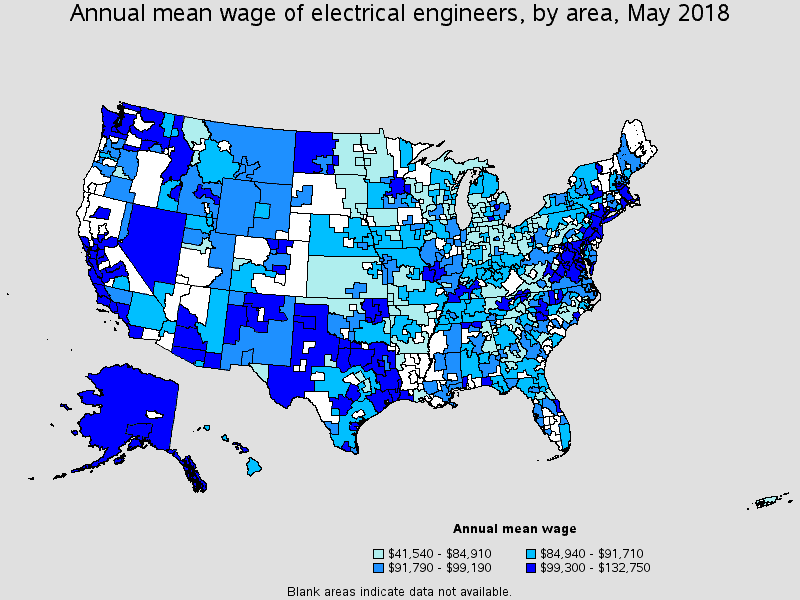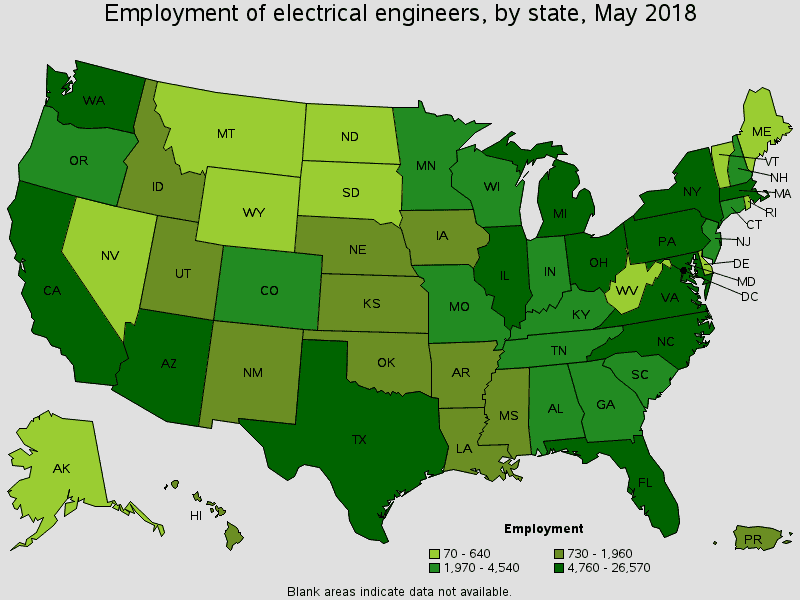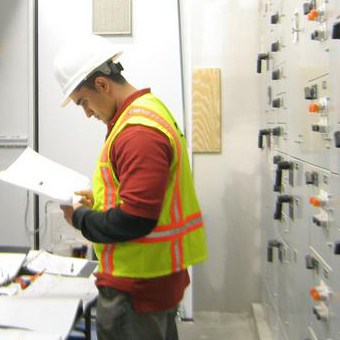Why become an electrical engineer? I can think of 10 solid reasons, and that’s if electricity and magnetism don’t already have you hooked.
Choosing to major in electrical engineering was a no-brainer for me. As a kid, I was fascinated by electricity and loved taking electronic devices apart to see how they worked.
But I get that electrical engineering might not resonate with everyone the same way it did for me. So, let me share 10 reasons why electrical engineering could be the perfect fit for you.
#1 Job demand
Electrical engineering is arguably one of the most diverse fields among all engineering disciplines. You’ll have tons of career options, whether you’re fresh out of college or considering a mid-career change. And trust me, the electrical field isn’t going anywhere.
Just look around—every industry relies heavily on power and electronics. Take a glance at your home and count the number of devices powered by batteries or wall sockets.
Even the Bureau of Labor Statistics projects a 3% job growth for electrical engineers between 2019 and 2029. Working in the power industry, I see an aging workforce, and the demand for skilled power engineers is through the roof.
And here’s the kicker: not one of my electrical engineer friends is unemployed. In fact, all of my college buddies in the field had jobs lined up before they even graduated.

#2 Salary
Let’s be real—salary is often one of the first things that comes to mind when considering a career. With the cost of living skyrocketing, you want to know how much money you can make in a particular field.
Here’s the deal: if you’re a go-getter and put in the work, there’s no pay ceiling in electrical engineering. Don’t let anyone tell you otherwise. You can start a business in the electrical field, focusing on things like:
- Designing and selling new equipment and components
- Consulting
- Launching an online service or product
But even if entrepreneurship isn’t your cup of tea, you can still make great money as an electrical engineer. In fact, there are numerous ways to rake in over $500k a year. Start by learning the attributes of the highest-paying engineering jobs, and you’ll know how to position yourself in the job market.
Check out this schematic showing typical annual salaries for electrical engineers across the U.S.:

As you can see, you can earn a sweet paycheck anywhere in the country. This flexibility lets you choose where you want to work, even in low-cost-of-living areas.
And if you’re worried about hitting a pay ceiling, just keep improving yourself. As with any profession, getting too comfortable won’t do you any favors.
#3 Broad field with many specialties
Whatever your interest, there’s probably an electrical engineering specialty you’ll love. There are just so many cool niches to explore. Here’s a list of some of the fields you can dive into:
- Electronics
- Energy systems
- Instrumentation
- Nanotechnology
- Photonics
- Power
- Robotics
- Signal processing/communications
- Systems and controls
- Telecommunication
And guess what? Each of these fields has its own subfields. For example, in the telecommunication field, you have these subfields:
- Digital television
- Fiber optics
- Information theory
- Mobile phones
- Satellites
- Wireless networks
The point is, the electrical field is vast and varied. You have endless choices, as every industry heavily relies on electricity. Plus, just think about all the diverse and exciting future products you could work on:
- Autonomous vehicles
- Robots and machines for the food and agricultural industry
- Kitchen appliance electronics
- Aerospace electronics
- Healthcare tools and machines
- High voltage power equipment
In the end, if you don’t like a certain job, you can easily pivot. Try browsing Indeed.com or EngineerJobs.com and searching “electrical engineering.” This will give you an idea of the scope of jobs at your fingertips.
#4 Global job demand
I can’t stress this enough: every aspect of modern life depends on the electrical field. Just imagine for a second if we suddenly lost all electricity worldwide. We’d instantly be thrown back hundreds of years.
What’s more, as developing nations modernize, their dependence on electricity only grows. Check out these examples of increased global demand for electrical infrastructure:
- Expanding power grids to meet the demands of growing cities
- Replacing fossil fuels with renewable energy sources to combat climate change
- Improving and expanding communication systems for growing populations
- Servicing growing populations with computers and other electronics
So, if you or your company aligns with this increase in demand, you’re set. Your customer pool will expand both domestically and globally.
#5 Constant innovations

Innovation and the electrical field go hand in hand. Every day, electrical products become faster, smaller, smarter, and more powerful. That means you can work on cutting-edge designs, keeping boredom at bay. Plus, engaging in meaningful and groundbreaking work will only inspire you further.
Keep in mind, though, that your job type will determine how much cutting-edge work you do. For example, compare working at Tesla to working as a city engineer. As a city engineer, you’ll do minimal design work and move at a slow pace.
But at Tesla, you’ll work on the bleeding edge of technology, collaborating with the brightest minds to drive humanity forward. So, in the right industry and role, you’ll dive into some seriously awesome projects.
#6 Barrier to entry
Getting an electrical engineering degree is no cakewalk. You’ll need to wrap your head around some tough electrical concepts and tackle loads of math. That’s why not everyone can survive the intense curriculum.
I remember in college, a bunch of my classmates switched majors after their first year. Those notorious weed-out classes are the real deal. And once you start working as an efficient engineer, you’ll face a whole new set of challenges. The work can be unforgiving and highly demanding, and you’ll compete against a surplus of workers and machines.
But, if you’re willing to put in the work, you’ll create job security for yourself and become difficult to replace. After all, exceptional electrical engineers are few and far between. And that’s crucial, given the bright future of electrical engineering.
#7 Entrepreneurial grooming
The journey to becoming an electrical engineer is a fantastic springboard into entrepreneurship. Here are some examples of how it crosses over:
- Relentless studying teaches you how to grind through business challenges
- Endless researching helps you find solutions to complex business questions
- Understanding difficult technical concepts prepares you to quickly learn business concepts
- Analytical training enables you to rationally approach business problems
Moreover, your technical knowledge sets you up for success in any tech-driven business. By deeply understanding technical subjects, you gain an edge over your competition, especially those who only have a business background and an MBA.
So you’ll be able to work closely with engineering teams in the trenches, solving problems together. In return, you gain greater creative control of projects, which is incredibly powerful.
#8 Understanding the world around you
As an electrical engineer, you’ll gain a deep understanding of the “how” and “why” behind so many amazing things. Just consider these mind-blowing technologies:
- Communication over phones
- Transmission of power
- Computer processing
- Power generation
- Lightening
- Lasers
- GPS
Plus, you’ll grasp the true impact of a powerful coronal mass ejection from the Sun. Super nerdy, I know, but it’s fascinating. Personally, I’m captivated by the role of electricity and magnetism in the universe, which helps me appreciate life even more.
Now, I’m not saying you need a degree to learn any of the above. In fact, I’m not the biggest fan of formal engineering education as it stands. However, formal education might just be the catalyst that kickstarts your independent learning journey, igniting your curiosity and opening your eyes to a whole new world.
#9 Career satisfaction
Chances are, you’ll work on life-altering, impactful designs, which I find incredibly awesome. Imagine contributing to projects like:
- Hydroelectric facilities: supplying water to millions of people
- Transmission lines: transmitting power to countless households
- Smartphones: enabling people around the globe to instantly connect together
- Video games: creating immersive and fun experiences for kids and adults
Trust me, having a job where you can see the immediate impact of your work is priceless, even when you don’t get recognition. Heck, a live NBA game wouldn’t be possible without electrical engineers. So the impact of electrical engineers reaches far and wide.
#10 Job location flexibility

One of the best things about electrical engineering is the job location flexibility. You can find work in practically every corner of the globe, which is a luxury few other engineers have.
Take aerospace engineers, for instance. They won’t have an abundance of jobs in every U.S. state. And then there are petroleum engineers who often travel to harsh environments, like freezing locations or unforgiving oceans.
For many folks, a lack of job location flexibility is a deal-breaker. Compare working inside an air-conditioned office versus braving below-freezing conditions outside. For a lot of engineers, it’s a no-brainer.
To drive the point home, the map below shows employment opportunities for electrical engineers in the U.S.

“Why to become an electrical engineer?” wrap up
If these 10 reasons aren’t enough to convince you, then consider black holes. Yup, I’m talking about those mysterious gravity sinks created by the densest points in spacetime.
A lot of black hole activity might be linked to electromagnetism, and I find that insanely cool. So in some odd way, you could be a part of this enigmatic phenomenon.
In the end, if you have even a tiny bit of interest in electrical engineering, you’ll come out a winner. You’ll work on awesome projects and meet amazing, brilliant people. And the cherry on top? You’ll make great money.
What are your thoughts on becoming an electrical engineer? What interests you the most about the electrical field?

Author Bio: Koosha started Engineer Calcs in 2019 to help people better understand the engineering and construction industry, and to discuss various science and engineering-related topics to make people think. He has been working in the engineering and tech industry in California for well over 15 years now and is a licensed professional electrical engineer, and also has various entrepreneurial pursuits.
Koosha has an extensive background in the design and specification of electrical systems with areas of expertise including power generation, transmission, distribution, instrumentation and controls, and water distribution and pumping as well as alternative energy (wind, solar, geothermal, and storage).
Koosha is most interested in engineering innovations, the cosmos, sports, fitness, and our history and future.

15:49 Non-pro HDD getting gradually as noisy as their pro counterpart over 10tb capacity. REPLY ON YOUTUBE